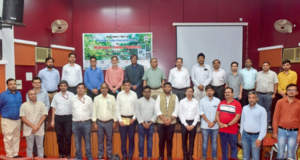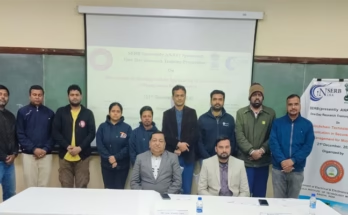 RNS: India has set its sight on becoming energy independent by 2047 and achieving Net Zero by 2070. Green hydrogen is viewed as a promising candidate, driving us towards this goal. Accordingly, a day-long stakeholders’ meet was organised by the Center of Hydrogen and Carbon Capture Storage and Utilisation Technologies (CHCCUST), IIT(ISM) Dhanbad for brainstorming ideas and presenting the case to the Department of Science and Technology, GOI to set up “Hydrogen Valley Innovation Cluster(HVIC) in the eastern zone of India.
RNS: India has set its sight on becoming energy independent by 2047 and achieving Net Zero by 2070. Green hydrogen is viewed as a promising candidate, driving us towards this goal. Accordingly, a day-long stakeholders’ meet was organised by the Center of Hydrogen and Carbon Capture Storage and Utilisation Technologies (CHCCUST), IIT(ISM) Dhanbad for brainstorming ideas and presenting the case to the Department of Science and Technology, GOI to set up “Hydrogen Valley Innovation Cluster(HVIC) in the eastern zone of India.
IIT(ISM) Dhanbad has been coordinating to set up one of the HVICs in IIT(ISM)’s Nirsa campus jointly with other reputed institutes such as IITs, NITs, state universities, CSIR labs, major multinational companies, and start-up foundations.
It being a theme of great importance in the contemporary era, the meeting-cum-workshop witnessed considerable footfall from all the various sectors. Academic professionals, industrial delegates, research scientists, and government representatives graced the occasion.
After the formal inauguration and welcome address by Professor Sandipan Kumar Das, Head, CHCCUST, IIT(ISM), the meeting commenced with the guidance and suggestions on the Hydrogen Valley Platforms and HVIC project by Dr. Ranjith Krishna Pai, Scientist E, Director, Climate Change and Clean Energy Division. Dr Pai is also the DST coordinator for the Hydrogen Valley Platform.
Rahul Kulshreshtha, working as an “Enabler” at Strategic Alliance Division, Office of the Principal Scientific Advisor to the Government of India, also shared his experiences and valuable thoughts on this occasion.
The technical sessions started with an introduction to the CHCCUST and an introduction to the consortium team members. Dr Ujjwal Pal from CSIR-IICT. Hyderabad shared his research on photocatalytic and electrocatalytic ways of generating hydrogen from water.
Professor Santanu De from IIT Kanpur, Professor Arunkumar Samanta from IIT Dhanbad and Ranju Gopal Barman, Director, Operations, Vivarta Greentech Solutions, presented ways to generate hydrogen from biomass and its huge potential in Jharkhand. Hydrogen storage and delivery is always a major challenge, and the workshop saw important inputs from Professor Sushant Kumar from IIT Patna and Dr Santosh M from CSIR-CIMFR, Dhanbad.
The aspect of utilising hydrogen was covered by Professor Siddhartha Sengupta and Prof. Ganesh Chandra Nayak from IIT(ISM) Dhanbad, and Dr Pratik Swaroop Dash, Head of Coal and Coke Making Research group and Environmental Research Group, Tata Steel.
Following this, Ugrasen Yadav, Associate Vice President, Process and Technology, Technip Energies, highlighted the challenges related to scaling up hydrogen-based technologies and potential ways to overcome them.
All the day-long deliberations were critically analysed and summarised in the panel discussion session on the theme of industrial and government perspectives on deploying hydrogen technologies and the path forward towards creating HVIC.
Panel members were U. Yadav, Technip Energies, Dr P. Dash, Tata Steel and K. Mandal, Vivarta Greentech Solution, S. Tandon, Head, Operations and Maintenance, Tata Power, N. Gupta, Senior General Manager, Process Automation India, Schneider Electric, A. Goswami, West Bengal Renewable Energy Development Agency.
It was moderated by Professor S. Das, IIT(ISM) Dhanbad.
In this day-long event, apart from the speakers and panellists, we also had representation from NIT Durgapur, BIT Sindri, Jadavpur University, CSIR-CMERI Durgapur. In the closing ceremony, Professor Rajiv Shekhar, Director, IIT(ISM), Dhanbad, emphasised upon the academia-industry close collaboration and motivating novel ideas.



